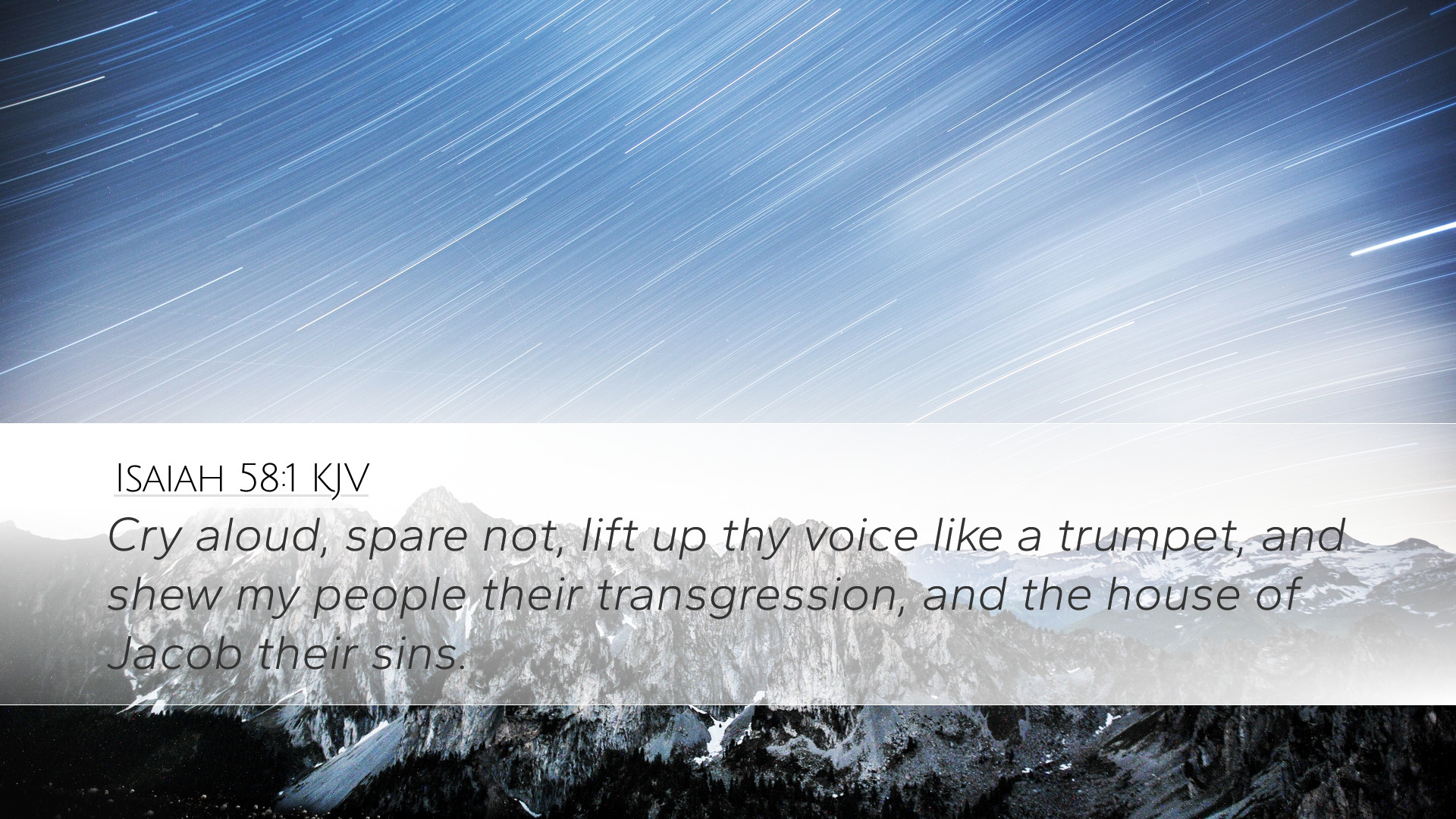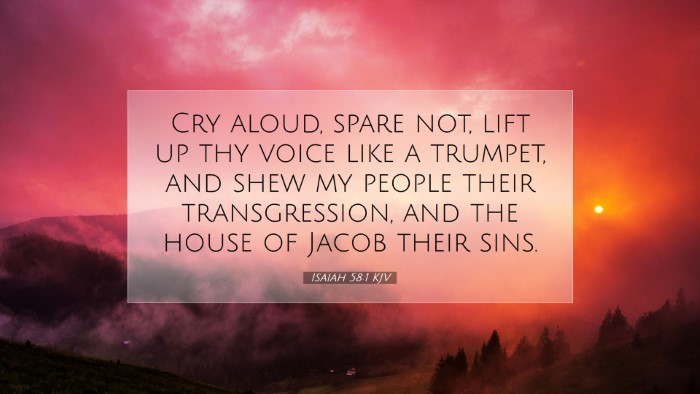Commentary on Isaiah 58:1
Verse: "Cry aloud, spare not, lift up thy voice like a trumpet, and shew my people their transgression, and the house of Jacob their sins." (Isaiah 58:1)
The opening verse of Isaiah 58 serves as a divine command for prophetic ministry—an urgent call to proclaim the truth of God’s message to the people of Israel. It encapsulates themes of repentance, divine judgment, and the critical need for authentic religious practice.
Contextual Overview
Isaiah’s prophetic ministry primarily operated during a time of social injustice, idolatry, and moral decay among the Israelites. This chapter's significance is emphasized when understanding the historical and spiritual landscape of God’s people, who were engaged in religious rituals yet failing to embody genuine devotion and justice.
- Prophetic Role: The prophetic role is underscored by the intensity of the commands. Isaiah is urged to 'cry aloud' and 'shew my people their transgression,' emphasizing the necessity for urgency and clarity in communicating God’s word.
- Symbolism of the Trumpet: The metaphor of raising the voice 'like a trumpet' signifies the announcement of impending judgment, as a trumpet traditionally heralded significant events and warnings in Jewish culture.
- Call for Transparency: The call to disclose the people’s sins establishes a crucial aspect of prophetic ministry: to shine a light on spiritual maladies, thereby promoting a path toward repentance and restoration.
Insights from Public Domain Commentaries
Matthew Henry
Matthew Henry emphasizes the boldness required in prophetic discourse. He notes that the expression 'raise thy voice like a trumpet' implies a need for clarity and loudness in calling out sins among the people. Echoing the dual task of denunciation and declaration, he states:
"The prophet must not only speak gently, but must cry aloud. There is a time for silence and a time for speaking, and in this case, the sin of the people warranted a great outcry."
Henry underscores that the specific focus on 'my people' indicates that God’s appeal is directed towards those who already belong to Him, highlighting that those closest to Him can also harbor significant sin and deviation from holiness.
Albert Barnes
Albert Barnes draws attention to the cultural and situational context of Isaiah’s ministry. He posits that the people were distinguished by their blindness to their own faults, engaging in shallow worship devoid of true repentance:
"It is a common trait of mankind to be oblivious of their own shortcomings while being quick to judge others. The Lord, through Isaiah, seeks to shake His people from this stupor."
Barnes further indicates that the prophetic call is not merely one of accusation; it is a call to self-examination and spiritual awakening, urging a return to genuine worship and ethics in alignment with God’s will.
Adam Clarke
Adam Clarke provides a nuanced exploration of this verse, emphasizing the importance of the figural language employed. He stresses the necessity for the appointed prophetic voice to be both loud and clear:
"The imagery of a trumpet does not only suggest volume but also clarity of intent; the message must pierce through the superficial and reach the core of the people's spiritual need."
Clarke highlights the notion of 'spare not,' indicating that those who speak the truth must be unreserved in their presentation, regardless of the cultural pushback or individual fear of reception. It is an admonition against cowardice in the face of social or institutional opposition.
Theological Reflections
This verse brings forth vital theological themes that resonate across time and continue to inform contemporary faith practices:
- God's Desire for Righteousness: The verse reflects God’s longing for His people to embody justice and righteousness rather than merely perform religious rites absent of true repentance.
- Restoration through Prophecy: Prophetic declarations, though often uncomfortable, serve a restorative purpose, galvanizing people towards spiritual transformation and alignment with divine principles.
- Call to Action for Modern Believers: The imperative 'Cry aloud' resonates with today’s messengers of the gospel, calling for boldness in confrontation with sin, with a heart aimed at restoration.
Conclusion
Isaiah 58:1 remains a powerful admonition for both leaders and laity within the church. It compels an urgent evaluation of the authenticity of worship practices, emphasizing that true fasting and devotion stem from a heart positioned towards God and neighbor. As pastors, theologians, and students delve into this profound text, it is an opportunity to not only understand the historical context but also to respond actively in promoting social justice, transparency, and a genuine walk with God.


